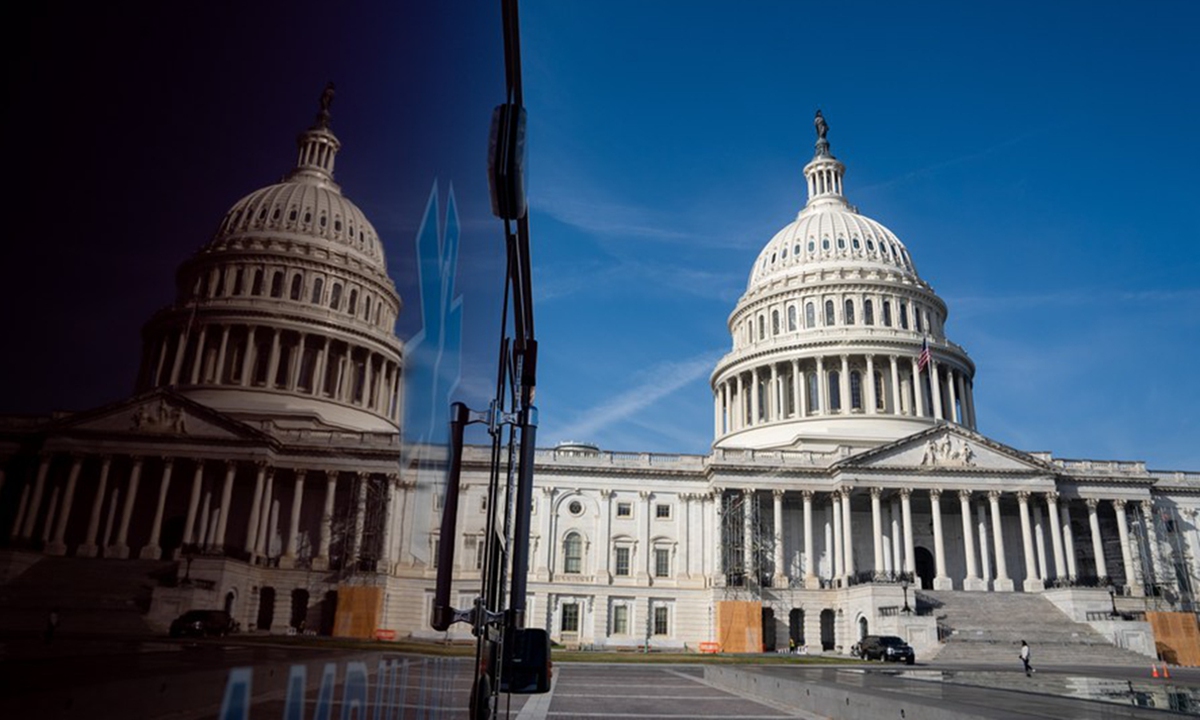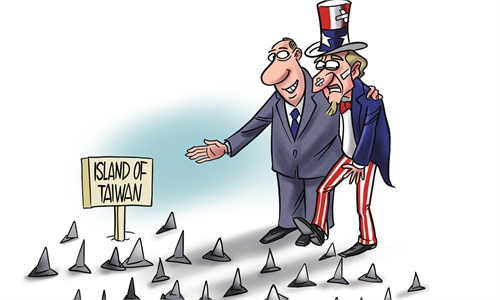
The US Capitol building is seen in Washington, DC., on November 4, 2022. Photo: Xinhua
In the US, foreign policies are shaped by both the president and Congress. Congress has the ability and opportunity to oversee, amend, prevent and influence the decisions of the president and the executive branch. In dealing with relations with China, the role of Congress is even more prominent, as it is not only a supervisor and collaborator of the executive branch but also an active policy initiator and promoter.
In recent years, there has been a significant increase in legislation related to China in Congress. Although the proportion of bills that ultimately become laws is not high, the tendency of Congress participating in and influencing US policies regarding China is evident.
Congressional bills related to China cover a wide range of areas, including economy and trade, human rights, military, technology, cyberspace, ideology, regional security and international mechanisms. Political intentions behind these bills differ.
To begin with, the US wishes to contain China's tech progress and economic development. With the improvement of China's basic research and technological innovation capabilities, the US has gradually boosted its efforts to suppress China's technology development.
The CHIPS and Science Act, signed into law in August 2022, aims to enhance US competitiveness by providing federal subsidies to the US semiconductor industry. The National Critical Capabilities Defense Act focuses on restricting US capital inflows into key technology companies in China. In July 2022, the House of Representatives passed the bipartisan Promoting US International Leadership in 5G Act, which calls for the US government to establish an interagency working group to work with allies and international partners to increase and align their engagement at multilateral international organizations, that address communications networks, standards, and security, including 5th and future generations mobile telecommunications and infrastructure.
Militarily, the aim of Congress' bills is to restrict Chinese military development, while hyping up China's "military threat." The Fiscal Year 2024 National Defense Authorization Act, currently under review, aims to address "threats" from China, Iran, Russia and North Korea by promoting innovation by empowering service members to help develop new military equipment, and "look beyond immediate threats and begin planning for the future of warfare."
The Congress also promotes bills to jeopardize China's sovereign and territorial integrity, blocking the great rejuvenation of the Chinese nation. For a long time, it has used legislation related to Xinjiang Uygur Autonomous Region, Xizang Autonomous Region, and the Taiwan question to interfere in China's internal affairs and undermining China's sovereignty and security. For example, regarding the Taiwan question, the content of congressional proposals has gradually expanded from arms sales to Taiwan island and expanding Taiwan's "international space" to enhancing Taiwan's overall readiness of its defense forces and combat capabilities.
The political objective underlying China-related legislation in diverse industries may differ, but the overarching goal is to protect America's strategic interests. Whether it is decoupling and disconnection in the economic and technological domains, prevention and competition in the military field, or a bias and conflict in ideology, all serve the consideration of America's strategic interests in the end. It is possible to say that legislation relating to China in various domains is unified in its political objective. Through a variety of strategies, they attempt to build domestic consensus and shift domestic tensions. For example, the "exclusion of Chinese funding" clause in the Chip and Science Act restricts US research institutions supporting Confucius Institutes from obtaining research funding from government agencies such as the National Science Foundation, Department of Defense and Department of Commerce. The "research security" clause strengthens the internal closure of the US national innovation system, limits normal scientific exchanges between China and the US and fully reflects America's intention to contain and counter China through both technological and cultural channels.
The political intent of Congress's legislation related to China also has the characteristic of combining reality and illusion. For example, in Xinjiang legislation (The Uyghur Forced Labor Prevention Act), protecting human rights and religious freedom is the more visible goal, while suppressing Xinjiang's economic development, undermining social stability in Xinjiang, and undermining the Chinese nation's unity and cohesion are the deeper and more genuine intentions. Similarly, since the Trump administration, the US has increased its efforts to restrict Chinese technology companies, and local governments in the US have implemented a wave of TikTok bans. Although a few politicians opposed the restriction on the basis of "free speech," Congress has made no effort to promote nationwide limitations based on the majority of MPs' views. A bill preventing federal government agencies from utilizing TikTok was passed at the end of 2022 as part of the "Consolidated Appropriations Act, 2023." The Senate introduced the RESTRICT Act in March 2023, which requires the Department of Commerce to identify, investigate, prevent and prohibit transactions involving communication technology products and services that pose risks to US national security and citizen safety, including those involving China and other foreign adversaries. While this law appears to safeguard US national security and citizen privacy, its true goal is to prevent Chinese businesses from challenging the dominating position of US social media platforms and to retain US technological capital's supremacy.
The author is an associate research fellow at the Institute of American Studies of China Institutes of Contemporary International Relations. opinion@globaltimes.com.cn


